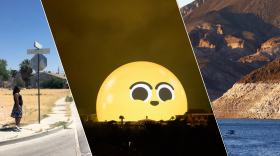In the early 1960s, the Windsor Park neighborhood came to life in North Las Vegas.
Southern Nevada was segregated at the time and Windsor Park was an opportunity for Black residents to own a home.
Decades later, a receding aquifer and seismic faults below the development have damaged many of the homes, and streets are full of empty plots where houses had to be leveled.
The saga of the neighborhood — and its residents — is told in a new documentary being shown tonight at UNLV.
“There was no engineering study done when they built Windsor Park; they didn't have an engineer go out and do any geotechnical work on that land,” said state Sen. Dina Neal, who represents the area and encouraged production of the documentary. “And so as that water started to be removed in the 80s, that started to sink and then the homeowners started to complain.”
Neal, whose father was the first Black to serve in the state Senate, said she “kind of grew up with the story.”
Damage from subsidence started to appear in the 1980s, prompting federal, state and local government action. It included a voluntary relocation program that about half the residents took advantage of.
Because of redlining, insurance coverage was impossible to get, which now leaves residents “no capacity to remedy this on their own without government help,” Neal told State of Nevada.
The subsidence issue has left parts of the neighborhood empty, a far cry from the close-knit community some remember.
Kenishqua Smith grew up in Windsor Park and is raising her daughter there and takes her to the same elementary school she attended, but now the streets are largely empty instead of full of homes.
“She wanted me to walk her down the same way I went as I walked to school, and it felt empty,” Smith said. “It felt like there was no love, it didn't feel good at all.”
Smith, who lives with her grandmother, said their house has a few cracks in the ceiling, but it's the area’s sense of community that has been severely damaged.
“Everybody knew each other. So it was like it was a family. And now it's just nothing,” she said.
Brett Levner, a UNLV associate professor of film, said the project gave her undergraduate and graduate students a chance to learn more about filmmaking — and where they live.
“They learn what's happening within their community, and then they also learn how they can use their craft, their skill sets to help impact and make change,” she told State of Nevada.
The city of North Las Vegas issued a statement that reads:
"The serious issues residents are facing are the result of Windsor Park's construction by a private developer on naturally occurring geologic faults in the 1960s, which almost immediately caused the houses to begin to sink.
"Due to the developer not adequately addressing soil conditions. The federal government stepped in in the early 1990s. with assistance from the state and city to provide relief to residents in the form of a voluntary relocation program that enabled half of the residents to relocate.
"The city has been engaged with federal and state leaders for more than two years, and will continue to engage with state and federal leaders to advocate for the residents of Windsor Park."
Neal said she’s going to keep advocating for area residents and won’t be deterred by the long-standing and complex nature of the problem.
“If we start off the conversation, saying I can't, then we never will,” she said.
Dina Neal, state senator; Brett Levner, filmmaker, UNLV associate professor; Kenishqua Smith, resident, Windsor Park









